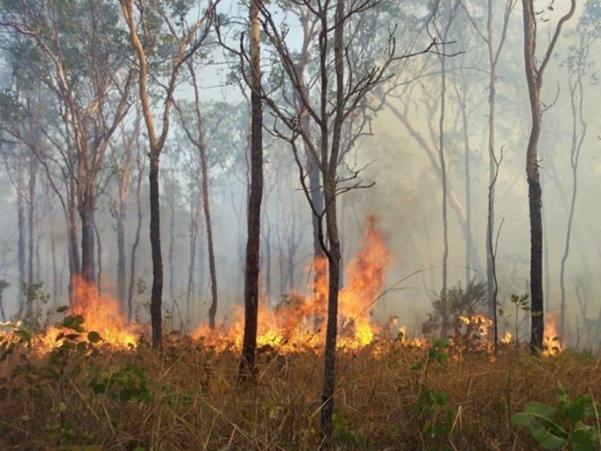Season 2018 webpage: one-stop-shop for broadacre information and advice
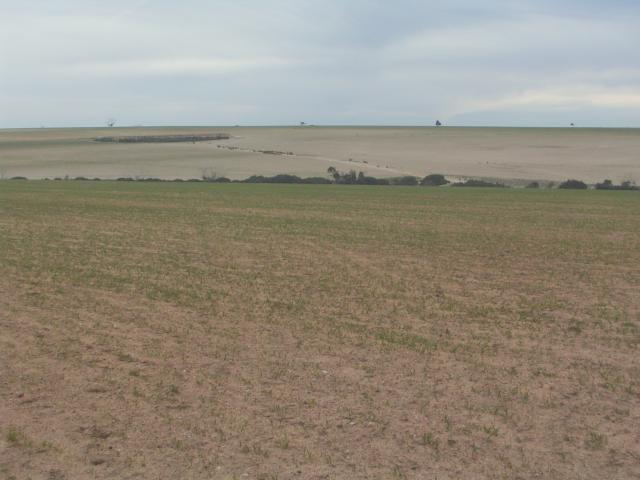
The Department of Primary Industries and Regional Development has compiled a wide range of technical information to assist landholders in the agricultural region to navigate the 2018 growing season.
A delayed break to the season and below average follow-up rainfall, particularly in the south eastern grainbelt and inland south coast, has forced some landholders to alter their seeding programs.
The dedicated Season 2018: Seasonal and Management Information for Farmers webpage features information on crop agronomy, livestock management, farm budgeting and health, and financial support.
The department’s Statistical Seasonal Forecasting (SSF) information system’s June to August outlook predicts a 40% chance of exceeding median rainfall, based on poor to good predictive skill.
This translates to rainfall in the 2-3 decile range across much of the grainbelt. The prediction is identical for the long term growing season outlook, for June to October.
Department officers are liaising with grower groups, consultants and farming organisations across the grainbelt, to ensure they have the information and support they require.
The department also has several online climate and weather tools and decision making aids, including:
- Weather stations and radar - real time data from more than 170 weather stations around the State, including weather summaries, charts and Doppler radar rainfall and wind images
- Seasonal climate information - which includes rainfall forecasts, plant available soil moisture maps, potential yield calculator and frost risk maps
- Rainfall to date tool - with graphs that can be tailored to location
- Soil water tool – with graphs that show soil water accumulation
- Potential yield tool - calculates potential wheat yields by location
- Extreme weather tool – maps real time information about frost and heat events.
The site also includes natural resource management advice about managing the risk of erosion, with widespread reports of wind events during autumn.
There are several articles on supplementary feeding for livestock, which could be a challenge for landholders across the agricultural region, after low levels of food-on-offer in 2017.
The department has a number of tools and calculators to assist sheep producers with grazing management.
Department officers across the regions will continue to liaise with landholders and industry stakeholders as the season unfolds.
The Season 2018: Seasonal and Management Information for Farmers webpage will be updated as the season progresses with relevant information.
For more information contact Renee Manning, Senior Policy Officer, Merredin on +61 (0)8 9081 3116.
Biosecurity funding schemes to tackle pest threats
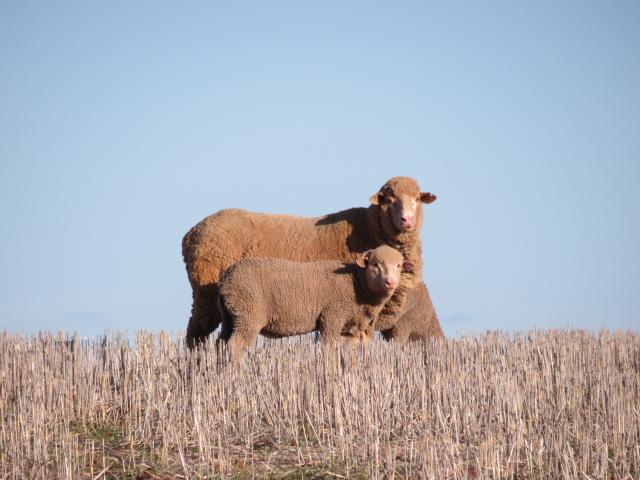
More than 99% of Western Australian cattle, sheep and goat producers and grain, seed and hay growers actively support the biosecurity of their industries by making financial contributions to WA’s Industry Funding Schemes.
Farmer contributions to Industry Funding Schemes will support a range of priority animal disease and pest control programs next financial year.
Executive Officer for the schemes, Rebecca Heath, said three-horned bedstraw, skeleton weed, virulent footrot and several cattle diseases were among the key issues to be targeted by the schemes in 2018/19.
“Industry-based management committees have determined which pest priorities are to be addressed, and made recommendations to the Minister for Agriculture and Food on the scheme’s areas of operation and the producer contribution rates,” Ms Heath said.
The schemes are an integral part of the State’s biosecurity system, helping to maintain access to domestic and international markets and supporting the viability and profitability of agricultural industries.
For the 2018/19 financial year the management committees have recommended that the contribution rates remain unchanged.
Cattle: 20 cent contribution on the sale of each animal/carcase to fund surveillance programs for bovine tuberculosis, enzootic bovine leucosis and Johne’s disease in cattle.
Sheep and goats: 10 cent contribution on the sale of each animal/carcase produced within the State, to fund a program to control virulent footrot. The Sheep and Goat Industry Funding Scheme management committee also anticipates funding a new program to address the impact of wild dogs on the industry. More information will be provided over the coming months.
Grains and seed: 25 cent contribution on the first sale of every tonne of grain and seed grown within the South West Land Division, to fund continuing programs to control skeleton weed and eradicate three-horned bedstraw.
Hay: 12.5 cents per tonne on the first sale of hay grown within the South West Land Division, to fund the skeleton weed and three-horned bedstraw programs.
Producers who wish to opt out of the scheme/s must submit a 2018/19 Notice of Opt Out form by 30 June 2018. Producers that opt out lose all entitlements to assistance and compensation via the scheme.
The continued support of producers for the schemes enables the WA livestock and grain/hay industries to identify and invest in biosecurity activities that help maintain our market advantage and the sustainability of the industries in Western Australia.
More information on the Industry Funding Schemes is available from the DPIRD website.
For more information contact Mar Hube, Manager, South Perth, on +61 (0)8 9368 3129.
Soils Ministerial Advisory Committee makes progress
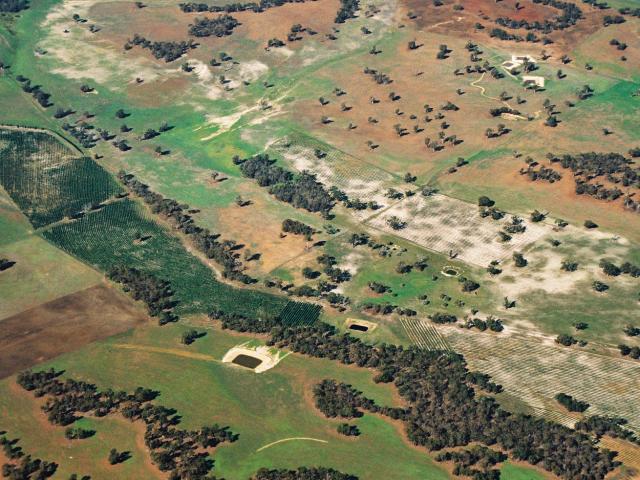
A process is underway to resurrect the Soil and Land Conservation Council into a more modern body to protect the State’s soil resources.
Agriculture and Food Minister Alannah MacTiernan announced a Ministerial Advisory Committee would oversee the next incarnation of the council last December.
The Soils Ministerial Advisory Committee is led by Department of Primary Industries and Regional Development senior soil scientist Tim Overheu. Other members of the committee include:
- Associate Professor Fran Hoyle (Deputy Chair) – University of Western Australia
- Andrew Watson – current Commissioner of Soil and Land Conservation
- Annabelle Coppin – Pilbara pastoralist
- Emma Mitchell – Gingin horticulturalist
- Bob Nixon – Kalannie broadacre farmer
- Burt Naude – soil scientist
- Stephen Frost – Narrikup sheep producer
- Assistant Professor Matthias Leopold – University of Western Australia
- Jules Alvaro – Merredin grain producer.
The committee is charged with determining the membership, skills and functions required for a revitalised council to guide the development of new policies and strategies for sustainable land management in WA.
This will include a review of the Soil and Land Conservation Act 1945 to identify and explore soil health priorities in WA, with the view of initiating the development of a State Soil Health Strategy.
Land management and conservation has changed dramatically since the former Soil and Land Conservation Council last met in 2003.
The new council’s focus will be much broader than land clearing, embracing new science and approaches to resource protection and regenerative agriculture.
The Soils Ministerial Advisory Committee has met several times to discuss recent land resource issues and is due to report by the end of March 2018.
For more information contact Tim Overheu, Senior Research Officer, Albany on +61 (0)8 9892 8533.
Expressions of interest open to join a soil testing program
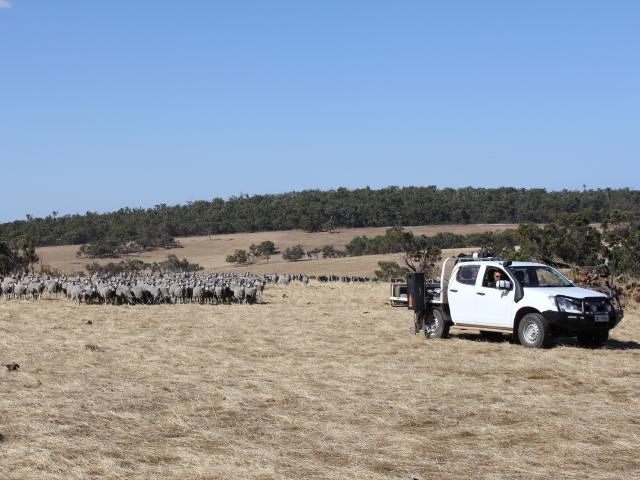
Expressions of interest are open for farmers to take part in a soil testing program to support informed on-farm fertiliser decisions.
As part of the program, graziers in priority areas of the south west will receive soil testing across their whole farm, pasture tissue testing, and nutrient maps showing nutrient surplus and deficiencies on their property.
The soil and plant tissue testing is combined with local workshops where farmers can learn about fertiliser management, and how to interpret their soil test results and nutrient maps.
Farmers will also have access to one-on-one agronomic advice with an accredited advisor who will provide personalised fertiliser recommendations for their property.
The program has shown that more than 70% of the 14 000 paddocks already tested have phosphorus levels higher than needed for desired pasture growth.
The excess application of phosphorus affects a farming operation’s financial bottom line as well as contributing to nutrient run-off into waterways, impacting the health of rivers and estuaries.
The program includes financial incentives for farmers receiving soil and plant tissue testing, with additional advice and support valued at over $5000. Farmers new to the program receive this value for a co-contribution of $300.
Graziers located in the coastal Peel-Harvey, Leschenault, Vasse-Wonnerup, Hardy Inlet, Wilson Inlet and Oyster Harbour catchments with more than 40 hectares of cleared, arable land are encouraged to apply for the 2018 soil testing program.
This four year program is part of the State Government’s $20 million Regional Estuaries Initiative.
The program is led by the Department of Water and Environmental Regulation in partnership with the Department of Primary Industries and Regional Development. Local catchment councils will provide farmers with on-ground support.
For more information contact Peta Richards, Development Officer, Manjimup on +61(0)8 9777 0144 or email nutrientmapping@dpird.wa.gov.au.
Why we must act on Gamba Grass now
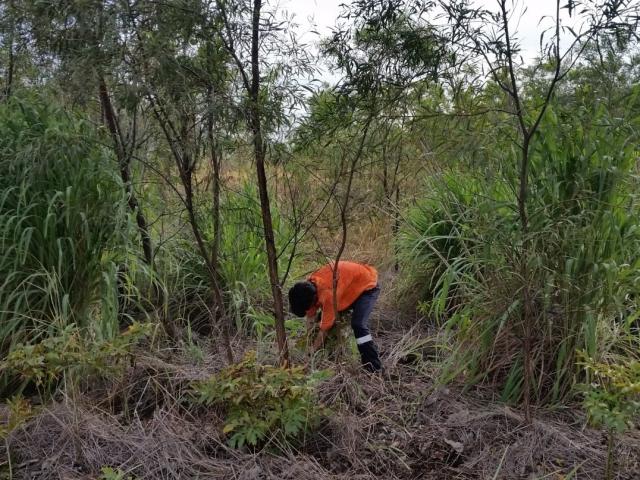
Fifteen years ago, Gamba Grass was a forage species with vast potential in the pastoral industry and was promoted and planted in the Northern Territory (NT) in the 1980s and 1990s.
However, spread has resulted in uncontrollable infestations which are the focus of hundreds of thousands of dollars of research funds and control efforts annually, not to mention the impacts to wildlife, agriculture, tourism, and fire-fighting resources.
A Gamba Grass Field Day was held at El Questro Station in the Kimberley last month to share learnings from more than ten years researching Gamba Grass in the Northern Territory.
Research has recorded Gamba Grass fuel loadings of up to 30t/ha, compared with native pasture fuel loadings of approximately 6t/ha. This significant fuel loading intensifies fire heat, increases flame height, and expedites movement of fires.
Gamba Grass-fuelled fires can be up to 24 times the magnitude of equivalent fires in non-invaded native pasture and savannah. The rapid spread of Gamba Grass and the intensity of Gamba-fuelled fires exacerbates the threat to bushland, farmland, horticulture, public recreational spaces and homes.
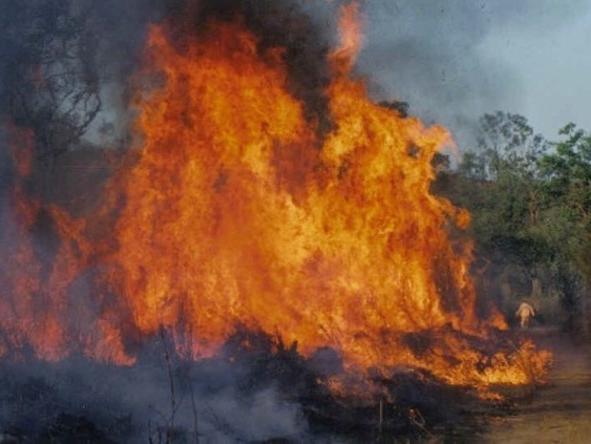
Participants at the field day learnt the financial impacts of Gamba Grass infestation go far beyond the direct damage to land and infrastructure. Stand-by costs for NT fire-fighters on declared total fire ban days (declared as a consequence of Gamba Grass fire threat), for example, have increased from $200/day in 2013 to $11 000/day in 2017.
Gamba Grass Management and Eradication zones in the NT consume significant public resources for the monitoring and legislative compliance involved with maintaining fire-breaks around property, infrastruture, and internal roads.
The messages from the NT research and management experience provides a valuable reminder to ensure that this weed is not able to spread and take over the Kimberley landscape.
The infestation at El Questro Station has been managed annually since 2006. Rangelands NRM, Department of Fire and Emergency Services, El Questro Station, Department of Primary Industries and Regional Development, Kimberley Rangelands Biosecurity Association and Department of Biodiversity, Conservations and Attractions have all contributed funds, personnel, expertise and equipment in a collaborative effort which has reduced the infestation area from the 1770ha planted in 1991 to less than 440ha in 2018.
A targeted eradication program is effectively reducing the known Gamba Grass area, with routine surveying efforts identifying and managing any new areas of infestation.
Combinations of aerial and foot surveys throughout El Questro station are used to map, treat and monitor Gamba Grass habitat during March through until June annually.
Gamba Grass is identified by its wide leaves, hairy leaf and stem surfaces and prominent white mid leaf vein. Seed can be spread by animals, human activity, water and wind. One plant can produce 70 000 seeds.
Your help is needed in identifying and reporting any plants to DPIRD.
If you suspect Gamba Grass on your property or elsewhere, you can contact Peter Robson, Biosecurity Officer on 91664047 or 0438 966 219.
Reports can also be lodged with the MyWeedWatcher app, or with the Pest and Disease Information Services.
For more information on Gamba Grass, please contact Kay Bailey, Manager – Invasive Species Priority Weed Response, Kununurra, on 9166 4017 or 0455 901 995.
Events, grants and scholarships
DPIRD supported events
Plan, Prepare, Prosper - Key to financial management, 15 June 2018, Wanneroo
‘A Key to Financial Management’ workshop is an opportunity to look beyond the physical production of your farming business to acknowledge and understand the farm business finances.
Plan, Prepare, Prosper: Succession, a business strategy, 20 June 2018, Newdegate
Understand how and why succession forms an integral part of the business plan.
Agristart CONNECT, 20 June, Manjimup
The CONNECT regional workshop series focuses on connecting to the local innovation community and developing strategic business skills.
Agristart CONNECT, 22 June, Geraldton
The CONNECT regional workshop series focuses on connecting to the local innovation community and developing strategic business skills.
What lies beneath? - soil constraints tour, 17-18 July, Muresk
An opportunity to interact with WA's soil experts and innovative growers at both large scale and intensive research sites over two days.
Plan, Prepare, Prosper: six-day program, 25 July - 3 August, Beverley
In partnership with the Beverley Women in Farming Enterprises Group, DPIRD is pleased to offer the suite of Plan, Prepare and Prosper workshops. These are free workshops designed to assist businesses involved in farming, fishing and food processing to plan for and manage variability in the seasons, global markets and other challenges they may face.
Ag-Tech Hackathon, 27-29 July, Perth
DPIRD's eConnected Grainbelt Project team is working with the Ministry of Data (MoD) to bring you an agriculture-themed hackathon that will bring together ag-tech savvy industry participants with talented developers to solve real-world problems.
Mingenew Midwest Expo, 15-16 August, Mingenew
An opportunity to chat with DPIRD staff at the 'Connecting people and building futures' exhibit.
WA Hoticultural Update, 16-17 August, Perth
Western Australia’s horticulture industries will have access to timely market information, grower case studies and industry research at the upcoming State Horticulture Update.
Biosecurity Blitz, 18-30 September, Statewide
Biosecurity Blitz 2018 will give everyone an opportunity to discover and report to us as many interesting or damaging pests (animals, insects, diseases and weeds) as possible across Western Australia over a period of two weeks.
Grants - new this edition
Collie Futures Small Grants Program, round 1 closes 18 July 2018
The Collie Futures Small Grants Program has been launched to drive economic growth and stimulate job creation in the South West town of Collie. Organisations can apply for grants from $5,000 to $250,000 to support local opportunities in a range of industries.
COGGO Research Fund 2019 EOI, closes 3 July 2018
The Council of Grain Grower Organisations Limited (COGGO) in Western Australia has established a 'COGGO Research Fund' to invest in research, development and extension projects that address issues affecting the profitability of Western Australian grain producers.
Expert for a day, Expressions of Interest
Food and beverage manufacturing businesses are invited to register their interest to participate in Food Industry Innovation (FII) programs, which support Western Australian businesses working in the value-added premium food and beverage sector to better capture market opportunities and enhance business viability and growth opportunities.
Export Market Development Grants, closes 30 November 2018
The Export Market Development Grants (EMDG) scheme is a key Australian Government financial assistance program for aspiring and current exporters. Administered by Austrade, the scheme supports a wide range of industries.
Grants - ongoing
Accelerating Commercialisation, no closing date provided
Accelerating Commercialisation, previously Commercialisation Australia, is focused on helping start-up companies commercialise new technology.
Advanced Production Systems Fund, no closing date provided
Hort Innovation is forging partnerships with top local and international researchers, innovators, commercial enterprises and Australian growers through a new and exciting multi-million dollar Hort Frontiers strategic partnership initiative – the Advanced Production Systems Fund.
Certain Inputs to Manufacture, no closing date provided
Provides Australian manufacturers importing chemicals, plastics, paper goods and metal materials, or goods used in food packaging, with duty-free tariff concessions to help reduce their importing costs.
Entrepreneurs’ Program, no closing date provided
The Entrepreneurs’ Programme uses experienced Advisers and Facilitators, drawn from industry, to ensure businesses get the advice and support needed to improve their competitiveness, productivity and to seek growth opportunities.
Farm Co-operatives & Collaboration, no closing date provided
A $14,934,000 Federal Government initiative that aims to provide farmers, fishers and foresters with knowledge, skills and materials on collaborative ideas, co-operative structures and collective strategies.
Farm water supply planning scheme, no closing date provided
Commercial broadacre farmer experiencing water shortages can apply for rebates to fund an audit and site inspection of farm water supply and improvements.
NACC Habitat Fencing Initiative, closes 30 June 2018
This project provides funding to land managers to protect the habitat of threatened flora and fauna and areas of priority remnant native vegetation in the Northern Agricultural Region (NAR).
Package Assisting Small Exporters, closes 30 June 2018
The Package Assisting Small Exporters (PASE) is a $15 million programme for small exporters administered by the Department of Agriculture and Water Resources. The PASE programme funds activities aimed at improving market access for small exporters.
Pastoral Water Grants Scheme, closes 30 June 2018
Provides grants of up to $20 000 for commercial pastoralists looking to develop alternative watering points to reduce grazing intensity around existing overgrazed and degraded water supplies.
New industries fund, rolled out over 4 years from 2018
The State Government’s New Industries Fund, will allocate $4.5 million across the nine regions of Western Australia to support venture creation, accelerate small-medium enterprise growth and seed innovation initiatives.
Supplier Improvement Plan, no closing date provided
Provides tailored advice to help your business to develop a better understanding of your customer’s needs and requirements, increase your supplier capability, and improve your access to new and existing markets.
Scholarships
A DPIRD sponsored scholarship assisting ag-tech start-ups develop innovations that address the challenges and opportunities encountered by the agriculture and food industry in Western Australia and globally.
Curtain Ignition Scholarship, closes 13 July 2018
Ignition is an intensive, one week entrepreneurial training program for aspiring entrepreneurs, academics and corporate innovators to trial and then prepare high growth business ideas for the commercial environment.
Food Safety Training Scholarship, closes 31 July 2018
The Duane Leadbetter Memorial Award gives funding of up to $5,000 AUD to complete a Lead Auditor Food Safety Training course.
Growing Leaders Scholarship Program, closes 29 June 2018
The Grower Group Alliance (GGA), in partnership with the CBH Group, are facilitating opportunities for up to three individuals to access the highly esteemed Leadership WA Signature and Rising Leadership Programs.
NAB Agribusiness Rising Champions Initiative, closes 29 June 2018
The NAB Agribusiness Rising Champion Initiative provides participants with the opportunity to network with some of Australia’s key beef industry leaders and provide contacts that will contribute to participant's career progression within the beef industry.
Nuffield Australia, closes 15 June 2018
Annually, Nuffield awards primary producers scholarships to support overseas travel and study.

